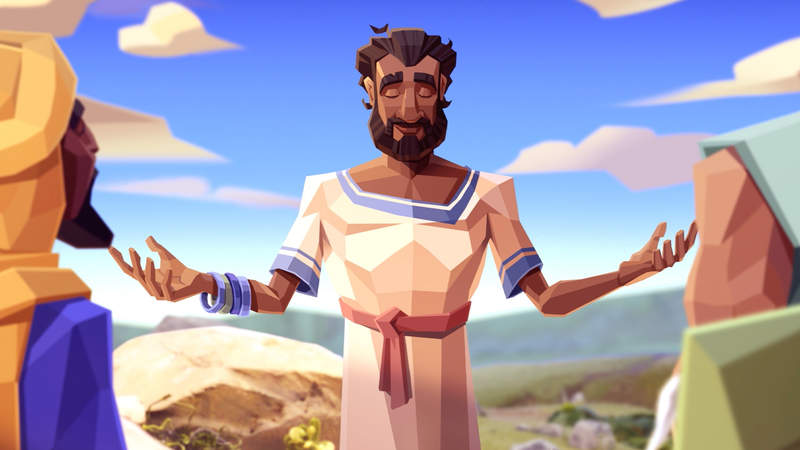The Lord's Prayer
About

Prayer is partly based on the belief that we can somehow talk with the God of the universe. But it’s pretty mysterious. Where do we even start? At the very center of a collection of teachings called the Sermon on the Mount, Jesus teaches his followers a simple prayer to adopt as their own. The prayer is made up of two short halves, each with three requests. The first half focuses on God’s purposes in the world, and the second half addresses our concerns in day-to-day life. It’s a short prayer, but it contains a whole new way to look at the world.
In this guide, explore the Lord’s Prayer alongside related videos, podcast episodes, and more.
Context
Key Themes
- God as “our Father”
- God’s reputation as uniquely good, loving, and holy
- Life in the Kingdom of God (or Kingdom of the skies)
- Rejecting scarcity by trusting in God’s provision
- Forgiveness for all people, especially opposers or enemies
- The goodness of testing and trials
- Deliverance from the causes and effects of evil
Structure
Our Father
Jesus begins the prayer this way:
9 “Pray, then, in this way:
‘Our Father, who is in heaven, Hallowed be Your name.
Why refer to God as being “in the skies?” In the Bible, the skies, or the heavens, are a way of imagining God’s universal power and presence that are high above all things. In God’s realm, God rules as the king whose will is always done.
But notice that Jesus refers to God as “our Father.” Most expect the God of the universe to be called something stronger, like “king” or “ruler.” However, a key claim in the Bible is that God has appointed humans as his representatives and beloved children to embody God’s wisdom and rule in the world.
26 Then God said, “Let Us make mankind in Our image, according to Our likeness; and let them rule over the fish of the sea and over the birds of the sky and over the livestock and over all the earth, and over every crawling thing that crawls on the earth.” 27 So God created man in His own image, in the image of God He created him; male and female He created them.

Your Name
The story of the Bible is about humanity’s disregard for this calling and how we make a mess of things. So the prayer continues this way:
9 “Pray, then, in this way:
‘Our Father, who is in heaven, Hallowed be Your name.
Holiness may sound like a fancy, religious word. But in the Bible, “holy” signifies God’s one-of-a-kind status. God is the source of all reality and the author of life, without beginning or end. And it’s this God who calls the family of Israel out from the nations and attaches his holy name to them. He sets them apart as his holy representatives to all the other nations.
Just like all of humanity, Israel messes up this calling. And this leads to their defeat and subjugation to many empires, bringing dishonor upon God’s holy name. But Israel’s prophets, like Ezekiel, said that one day God would restore the holiness of his name among the nations.
22 “Therefore say to the house of Israel, ‘This is what the Lord God says: “It is not for your sake, house of Israel, that I am about to act, but for My holy name, which you have profaned among the nations where you went. 23 And I will vindicate the holiness of My great name which has been profaned among the nations, which you have profaned among them. Then the nations will know that I am the Lord,” declares the Lord God, “when I show Myself holy among you in their sight. 24 For I will take you from the nations, and gather you from all the lands; and I will bring you into your own land. 25 Then I will sprinkle clean water on you, and you will be clean; I will cleanse you from all your filthiness and from all your idols. 26 Moreover, I will give you a new heart and put a new spirit within you; and I will remove the heart of stone from your flesh and give you a heart of flesh. 27 And I will put My Spirit within you and bring it about that you walk in My statutes, and are careful and follow My ordinances. 28 And you will live in the land that I gave to your forefathers; so you will be My people, and I will be your God.

Your Kingdom and Will
God will restore the holiness of his name among the nations by raising up a new representative, who will restore God’s rule over Israel and the world so that everyone sees the holiness and goodness of God. And when Jesus announces the arrival of God’s Kingdom, he claims to be this representative. This makes sense of the next lines of his prayer:
10 ‘Your kingdom come. Your will be done, On earth as it is in heaven.
Jesus teaches his followers that when we love God and our neighbor, and when we treat others with God’s generosity and justice, we are entering God’s Kingdom. So this is a prayer for the reunion of Heaven and Earth, and we’re invited to participate.
This completes the first half of the prayer, which focuses on loving God and seeking his will.

Give Us Our Daily Bread
The second half of the prayer shifts to the challenges of daily life as we pray for God’s Kingdom to come.
11 ‘Give us this day our daily bread.
This is as basic as it gets, asking God to provide food. Jesus uses an image from Israel’s story, when they journeyed through the wilderness and God provided just enough bread for each day.
4 Then the Lord said to Moses, “Behold, I will rain bread from heaven for you; and the people shall go out and gather a day’s portion every day, so that I may test them, whether or not they will walk in My instruction. 5 On the sixth day, when they prepare what they bring in, it will be twice as much as they gather daily.”
Remember, Jesus’ audience is filled with poor people, struggling to get by during the Roman occupation. And here, he invites them to join their ancestors in the wilderness, trusting God for provision each and every day.

Forgive Our Debts
Jesus continues the prayer.
12 ‘And forgive us our debts, as we also have forgiven our debtors.
Forgiveness is central to Jesus’ movement. He announces that God is forgiving Israel and all humanity for its long history of violence and greed. And so he calls his followers to do the same—to forgive those who hurt us. Jesus sees that our desire for revenge only keeps the cycle of pain going. So he teaches that forgiveness begins with naming the wrongdoing but then not seeking vengeance.
This doesn�’t necessarily mean becoming best friends with the people who wrong us. But it does mean we release our right to get even, and even learn to pray for their well-being.
43 “You have heard that it was said, ‘You shall love your neighbor and hate your enemy.’ 44 But I say to you, love your enemies and pray for those who persecute you,
This kind of forgiveness requires radical trust in God. And Jesus invites us to see that forgiveness is like breathing. In order to truly receive and take in God’s forgiveness, you need the habit of giving it out. The two work together as one.
14 For if you forgive other people for their offenses, your heavenly Father will also forgive you. 15 But if you do not forgive other people, then your Father will not forgive your offenses.
21 Then Peter came up and said to Him, “Lord, how many times shall my brother sin against me and I still forgive him? Up to seven times?” 22 Jesus *said to him, “I do not say to you, up to seven times, but up to seventy-seven times.
23 “For this reason the kingdom of heaven is like a king who wanted to settle accounts with his slaves. 24 And when he had begun to settle them, one who owed him ten thousand talents was brought to him. 25 But since he did not have the means to repay, his master commanded that he be sold, along with his wife and children and all that he had, and repayment be made. 26 So the slave fell to the ground and prostrated himself before him, saying, ‘Have patience with me and I will repay you everything.’ 27 And the master of that slave felt compassion, and he released him and forgave him the debt. 28 But that slave went out and found one of his fellow slaves who owed him a hundred denarii; and he seized him and began to choke him, saying, ‘Pay back what you owe!’ 29 So his fellow slave fell to the ground and began to plead with him, saying, ‘Have patience with me and I will repay you.’ 30 But he was unwilling, and went and threw him in prison until he would pay back what was owed. 31 So when his fellow slaves saw what had happened, they were deeply grieved and came and reported to their master all that had happened. 32 Then summoning him, his master *said to him, ‘You wicked slave, I forgave you all that debt because you pleaded with me. 33 Should you not also have had mercy on your fellow slave, in the same way that I had mercy on you?’ 34 And his master, moved with anger, handed him over to the torturers until he would repay all that was owed him. 35 My heavenly Father will also do the same to you, if each of you does not forgive his brother from your heart.”

Deliver Us From the Evil One
Finally, Jesus concludes the prayer.
13 ‘And do not lead us into temptation, but deliver us from evil.’
Does this mean that God might test us? We actually see tests all throughout the Bible. In the biblical story, God appoints humans as his representatives to rule the world, and that opportunity presents them with a test. Will they partner with God and rule by his wisdom or break away from God and operate by their own wisdom? While God intends this test to strengthen them, there’s another voice that twists God’s good test into a trap that tempts humans to trust their own wisdom. So yes, God presents good testing moments for people, but the evil one presents traps. And we get to decide whose voice we will trust.
Jesus knows that life is full of choices that will force us to choose who or what we will trust, so he teaches us to pray for deliverance from the evil one.
Jesus Prayed This Prayer
This is not only the prayer Jesus taught to his followers—it’s the prayer that Jesus himself prayed. When he faced his greatest test in the garden, the night before his crucifixion, he prayed these words. Jesus even asks the Father to take this responsibility, or “cup,” from him. As a true human being, he wants to survive. But because he trusts his Father’s will even more than his basic human instinct, he prays:
39 And He went a little beyond them, and fell on His face and prayed, saying, “My Father, if it is possible, let this cup pass from Me; yet not as I will, but as You will.” 40 And He *came to the disciples and *found them sleeping, and He *said to Peter, “So, you men could not keep watch with Me for one hour? 41 Keep watching and praying, so that you do not come into temptation; the spirit is willing, but the flesh is weak.”
42 He went away again a second time and prayed, saying, “My Father, if this cup cannot pass away unless I drink from it, Your will be done.”
Jesus hopes for the same thing he previously prayed for: “May your Kingdom come and will be done.” And because this prayer is his habit, he continues following the way of God and trusting in his promises even in the face of unjust arrest and execution.
Jesus is delivered from the evil one when God raises him from the dead. In fact, it is through his act of self-giving love that God’s forgiveness and heavenly Kingdom come to Earth. This is how God’s holy name is restored. And Jesus invites every human being to embrace the same kind of love and trust in God’s will so that we may partner with him in his resurrection way of life that even death can’t corrupt.
